The art of European living can be mastered in the Mediterranean country of Croatia. Sip coffee next to the ruins of an ancient Roman temple in the morning, swim in the royal blue waters of the Adriatic Sea in the afternoon, and explore the once gas-lit cobblestone streets of a hilltop town in the evening.
Every day in Croatia is to be savored. From nibbling on jade-colored olives and tasting ruby-red zinfandel, to inhaling the fresh sea air and laughing around an open fire, life on the western coast of the Balkan Peninsula is invigorating. And, it can be enjoyed part-time.
Croatia has long been a favorite destination for European vacationers. For decades they flocked to its beaches and walled towns when it was a part of the former country of Yugoslavia. In recent years, Croatia has become increasingly popular, thanks to many of its landscapes being featured in the HBO series Game of Thrones.
The country declared its independence from Yugoslavia in 1991, and its regulations and institutions have been slowly evolving ever since. It can be difficult to settle in Croatia permanently if you’re not a citizen of the European Union, if you don’t have family ties to Croatia, or if you haven’t started a business there. Despite the administrative challenges many expats face while trying to make Croatia a permanent home, the country is still a superb place for a part-time retirement, thanks to its pleasant climate, lower costs, and exploration opportunities.
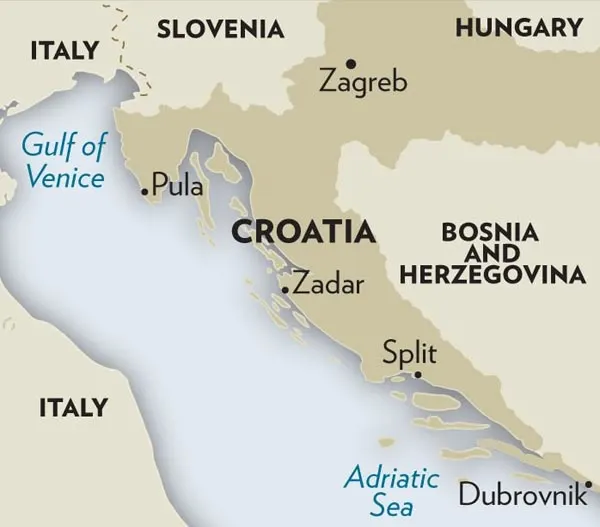
Part-Time Croatian Living
Since 2013, my husband, Shawn, and I have been spending up to three months at a time in Croatia. For several winters, we based ourselves in Croatia’s second-largest city of Split and in the nearby town of Trogir—a UNESCO World Heritage site. We also lived in the coastal city of Pula and had the opportunity to spend a few weeks among the vineyards in the country try’s interior. Along the way, we visited many of Croatia’s islands, national parks, and towns. We paid between $445 and $525 a month to rent studio or one-bedroom apartments.
We’re not alone in recognizing Croatia’s part-time possibilities. Maribeth Theisen and her husband, Allan Atherfold, have been coming to Croatia for four years, using it as a part-time European home base from which to sail the Adriatic and travel to other countries by car.
“The weather in Croatia is incredible nine months a year, perfect for water sports, hiking, climbing, and sightseeing,” Maribeth says. “Neither of us enjoys cold weather, so sailing in Croatia in the summer and heading to Hawaii for the winter works very well.”
For the past two-and-a-half years, Beth Hoke, a self-described “empty nester,” has been spending close to 90 days at a time in Croatia. She started coming to Croatia when her two daughters moved overseas.
“When I knew they were both going to be [in Europe] long-term, I came over as well. I couldn’t let them have all the fun,” she says.
Beth says she was originally drawn to Croatia because it is not yet part of the Schengen Zone, allowing her to spend time inside other European countries. She also found Croatia to be “stunningly beautiful” and “inexpensive.”
Based on the idea that Croatia could make a good part-time retirement destination, I’ve singled out four coastal cities that would make ideal hubs for exploring Europe: Dubrovnik, Split, Zadar, and Pula. Here, you can take advantage of well-developed transportation networks and urban amenities such as hospitals and shops.
Get Your Free Report on the World's Best Places to Retire in 2025
Get Your Free Report on the World's Best Places to Retire in 2025
Simply enter your email address below to sign up for our free daily postcard e-letter and we'll also send you a FREE report on The World's Top 10 Retirement Havens for 2025.

By submitting your email address, you will receive a free subscription to IL Postcards and special offers from International Living and our affiliates. You can unsubscribe at any time, and we encourage you to read more about our Privacy Policy.
Croatia—The Basics
Croatia is a member of the European Union (EU). However, the country is not yet part of the Schengen Area—a zone that includes 26 European countries. Croatia is expected to join the Schengen Area in the near future. As of this writing, an exact entry date has not been established.
Visas: Citizens of Australia, New Zealand, Canada, and the U.S. can visit Croatia for up to 90 days in a 180-day period. No visa is required for tourism purposes. If you wish to stay in Croatia for more than 90 days, you must visit the local police station in your preferred Croatian city to formally apply for a longer visa. Note that administrative requirements can vary from city to city. Expats often report that requirements can change frequently and that guidelines can be inconsistent.
Currency: Although Croatia is a member of the EU, the country uses the kuna and has not yet adopted the euro ($1 = 6.70 Croatian kuna at time of writing).
Climate: Croatia’s varied geography means that it has a Mediterranean and continental climate. Its coastal areas offer milder winters and hot, dry summers. However, the inland regions, including Zagreb, tend to have colder winters and hot summers.
Cuisine: The food in Croatia’s coastal areas is fundamentally Mediterranean, but infused with decidedly Balkan characteristics. As a result, you’re likely to encounter lots of fresh seafood drizzled in olive oil and sprinkled with rosemary. Hearty stews paired with gnocchi are also common. Ajvar, a condiment made from roasted red capsicum and eggplant, usually accompanies meat dishes.
Since this is the Mediterranean, you’re bound to find high-quality wine. The zinfandel varietal is believed to have its ancestral homeland near the city of Split.
Language: Croatian is the official language, though you will find that English is widely spoken—especially among younger Croatians. English is taught in schools, but many Croatians will tell you that they learned English while watching American television programmes. As with any country, you’ll please the locals if you learn some basics of their language.
Connect With Others: As Croatia continues to become increasingly popular with foreigners, many expat communities have grown. One good way to connect with locals and foreigners alike is to join Facebook groups. These online communities will keep you abreast of local events. In Facebook’s search bar simply type in the name of your preferred community, along with the word “expats.” Expats in Split, Expats in Zagreb, and Croatia Insider: Lifestyle Hacks for Travelers, Expats and Digital Nomads, are several examples of active groups.
Dubrovnik—Film-Worthy Scenery
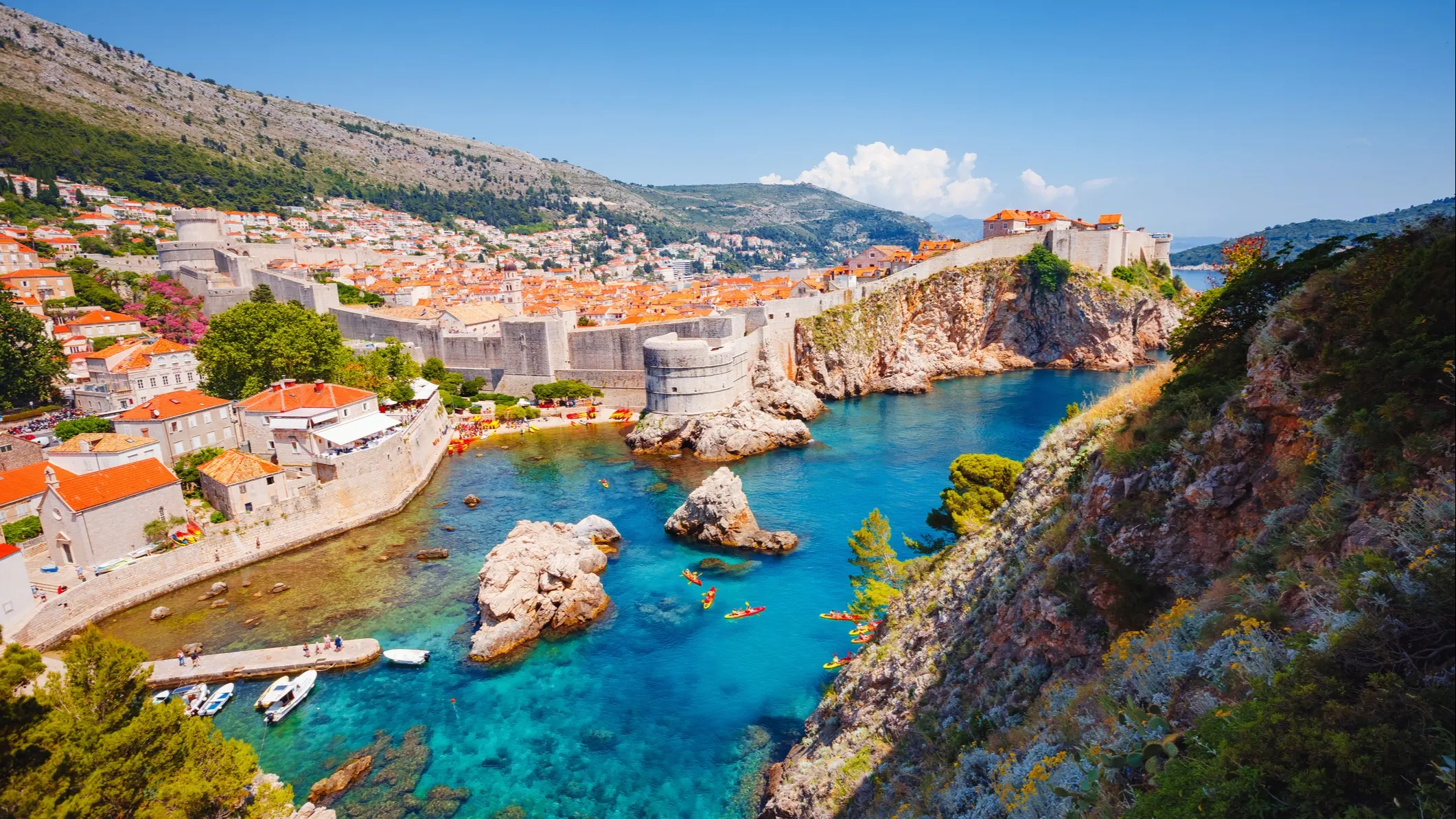
Known as the “Pearl of the Adriatic” because of its magnificent walled Old Town, Dubrovnik is Croatia’s most famous destination. Sandwiched between mountains and the glittering Adriatic Sea of the southern Dalmatian Coast, Dubrovnik was once a part of Ragusa, a wealthy maritime republic that was in competition with the Venetian Empire. Today, the city is well known for having served as the backdrop for King’s Landing in the HBO show Game of Thrones.
Modern-day explorers flock to Dubrovnik to walk its extensive city walls, which together with the city’s Old Town, are inscribed on UNESCO’s World Heritage List. The walls were built over the course of a few centuries and offer commanding views of the sea and nearby islands.
Visitors to Dubrovnik can also stroll its well-worn streets while admiring its elaborate palaces, churches, monasteries, and fountains. For extraordinary views of the city, you can ascend Dubrovnik’s Mount Srd via cable car or on foot.
From Dubrovnik it’s easy to hop to the islands of Lokrum, Korcula, and Mljet. There are also ferry connections to the southern Italian city of Bari.
By land, Dubrovnik is near the borders with Montenegro and Bosnia-Herzegovina. As a result, you can make a day trip to the fjord-like Bay of Kotor and its signature fortress. You can also visit the town of Trebinje, which is only 21 miles from Dubrovnik. Here you’ll have the chance to visit the city’s historic Ottoman-era bridge and the Tvrdoš Monastery, where monks produce wine.
Only 40 miles to the north, the town of Ston is also worth visiting. Its imposing walls wrap around the city and are reminiscent of the Great Wall of China. Ston is renowned for its high-quality oysters and long tradition of sea salt production. Dubrovnik’s accommodation options are plentiful. Currently, there is a two-bedroom apartment listed on Airbnb for $767 a month from the month of November.
The property is two miles from the Old Town, and it’s located in a green area, close to parks. The city is incredibly popular with cruise ship travelers, meaning that its Old Town core can become uncomfortably crowded during peak travel months (July and August). If you wish to escape this hustle and bustle, you might consider basing yourself in tiny Cavtat, which is located near vineyards and Dubrovnik’s airport.
Dubrovnik’s international airport is well connected to the rest of Europe and is serviced by British Airways, Croatia Airlines, Iberia, and budget carriers such as EasyJet, Volotea, and Eurowings.
Split—Island Hopping and a Roman Palace
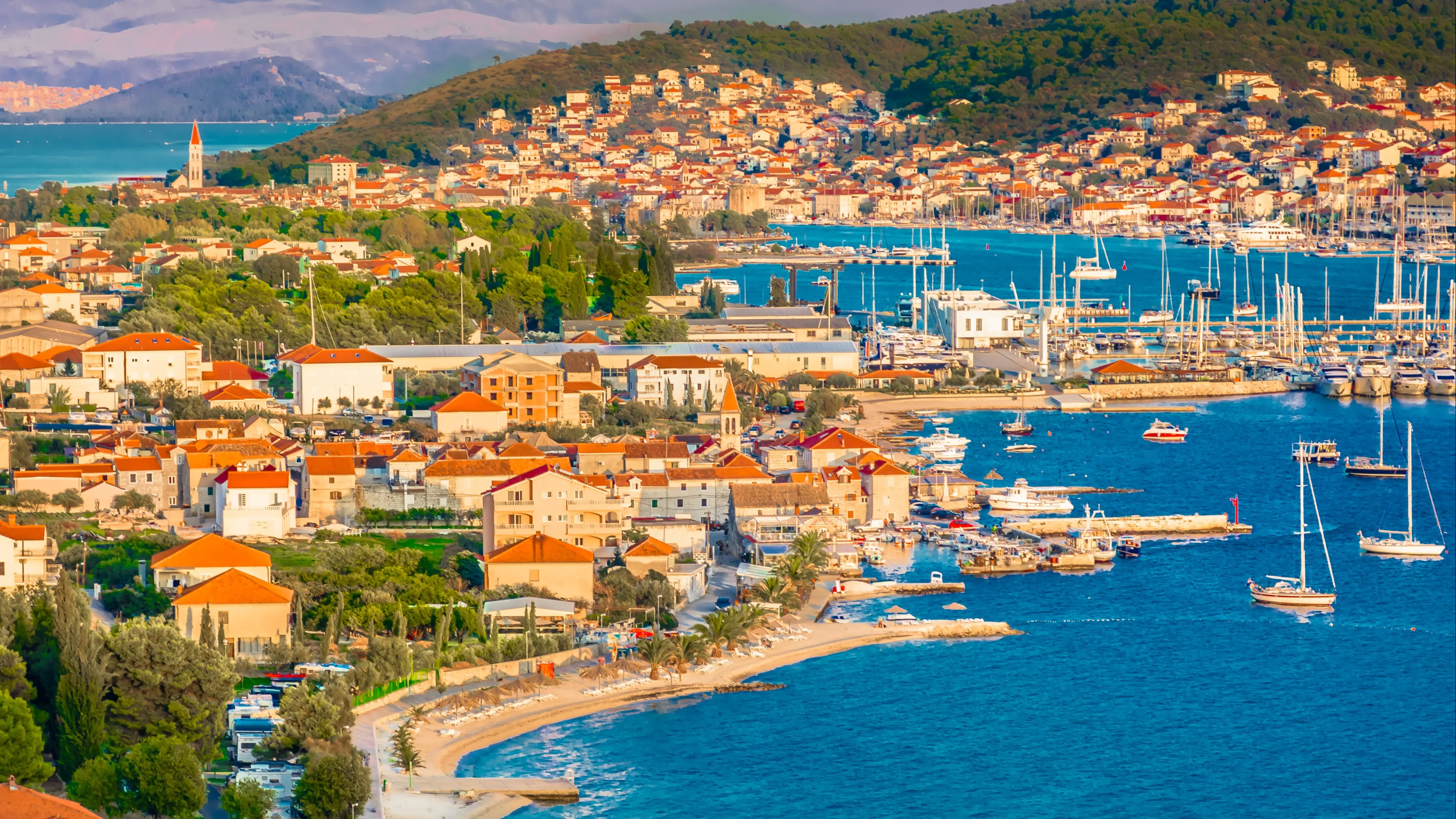
Split is Croatia’s second-largest city and home to the 1,700-year-old palace built by Roman Emperor Diocletian. Unlike ruins elsewhere in Europe, Diocletian’s Palace is still home to many locals—a legacy of the security the palace walls offered after the fall of the Roman Empire.
Just footsteps away from Diocletian’s Palace is Marjan, a forested park filled with evergreens, cypress trees, and agave plants. Many of Croatia’s postcard scenes are snapped here, which is not surprising given Marjan’s commanding views of the Old Town, Adriatic Sea, and the nearby islands of Brac, Solta, Ciova, and Hvar. Centuries-old chapels and hermit caves dot Marjan’s landscape, offering hikers, cyclists, climbers, and beachgoers a touch of history while inhaling the park’s fresh air. You’ll also be tempted to take to the water yourself when you see the sailboats gliding by.
The Riva is Split’s place to see and be seen. Situated along the water’s edge and lined with palm trees, this promenade is studded with cafés and restaurants. During the lead-up to Christmas, the Riva hosts holiday performances and chaletlike huts, which serve up hot spiced wine and traditional Croatian treats. Near the Riva, you’ll also find markets for fresh produce and fish.
As Croatia’s second-largest city, Split has several wonderful museums. These include a comprehensive archaeological museum and a gallery that houses the works of Croatia’s most famous sculptor, Ivan Mestrovic.
Split also boasts a sizeable university, a large hospital, and a thriving expat community. These characteristics have made the city increasingly popular with foreigners, meaning that rental costs have risen in recent years. For this reason, you might want to base yourself in a community just outside of Split, something that part-time expat Beth Hoke has done three times.
“I stayed in Podstrana once (just south of Split) and Okrug Gornji (just north of Split) twice. Split was easily accessible from both locations via public transportation, but the housing costs were a bit lower [outside of Split],” Beth says. “In Podstrana, I was right on the beach and in Okrug Gornji, I was within a 10- to 15-minute walk from the beach. I stayed in Okrug Gornji in late spring/early summer and Podstrana in late autumn/early winter. I paid the same for both two-bedroom apartments— between $475 and $500 per month.”
Split boasts a substantial university, large hospital, and a thriving expat community.
Two more destinations outside of Split include Trogir and the Klis Fortress. Trogir is only 16 miles up the coast and is a UNESCO World Heritage-listed town defined by Romanesque and Renaissance architecture. The Klis Fortress—an imposing structure overlooking a scenic mountain pass—was also featured in Game of Thrones.
In addition to having aesthetic, cultural, and historic appeal, Split also offers an extensive transportation network. It has an international airport which is serviced by major and budget carriers and has a centralized bus and train station. Next to the bus station you’ll find a ferry terminal leading to stunning island hot spots like Brac, Hvar, Šolta, Korcula, and Vis. You can even reach the Italian city of Ancona by ferry.
Another popular getaway from Split is the city of Mostar, in neighboring BosniaHerzegovina. Once part of the Ottoman Empire, Mostar’s most famous sight is its 16th-century arched bridge, which was destroyed during the 1990s conflict. The bridge was recently rebuilt and is flanked by historic neighborhoods brimming with Bosnian coffee houses and sweet shops bursting with lokum (Turkish delights). You’ll also have abundant opportunities to pick up a souvenir in the form of a handmade copper tea set or a colorful rug.
Get Your Free Report on the World's Best Places to Retire in 2025
Get Your Free Report on the World's Best Places to Retire in 2025
Simply enter your email address below to sign up for our free daily postcard e-letter and we'll also send you a FREE report on The World's Top 10 Retirement Havens for 2025.

By submitting your email address, you will receive a free subscription to IL Postcards and special offers from International Living and our affiliates. You can unsubscribe at any time, and we encourage you to read more about our Privacy Policy.
Finding Accommodations
Croatia’s popularity as a tourist destination means that it has an ample supply of hotels, privately owned rooms, and apartments. Here are some points to take into consideration when you look for a rental of one month or more…
Finding a Good Deal: The best prices are to be had during the off season, when many tourist properties sit empty. Agencies, as well as sites like Airbnb and Booking.com, will serve up lots of properties. However, these sites charge a fee. For better deals, contact accommodation owners directly via their website or Facebook page. Likewise, peruse the local classified site Njuskalo.hr. It is in Croatian; however, Google Translate can help you decipher the listings. Another approach is to reserve a room in your preferred city for a few nights. Once you have your feet on the ground, you can pop into cafés and small shops to ask locals for accommodation leads.
Generally, you’ll get a better deal if you stay for at least one month. If you’re willing to clean the apartment yourself and provide your own supplies, hosts are also more likely to lower their prices.
Registration: Foreign tourists are expected to register with the local police when they check in to a new Croatian city. Generally, your hotel or apartment owner will do this administrative task for you, but sometimes they fail to do so. If you are in doubt, ask your host for clarification.
Zadar—Legendary Sunsets and Roman Relics
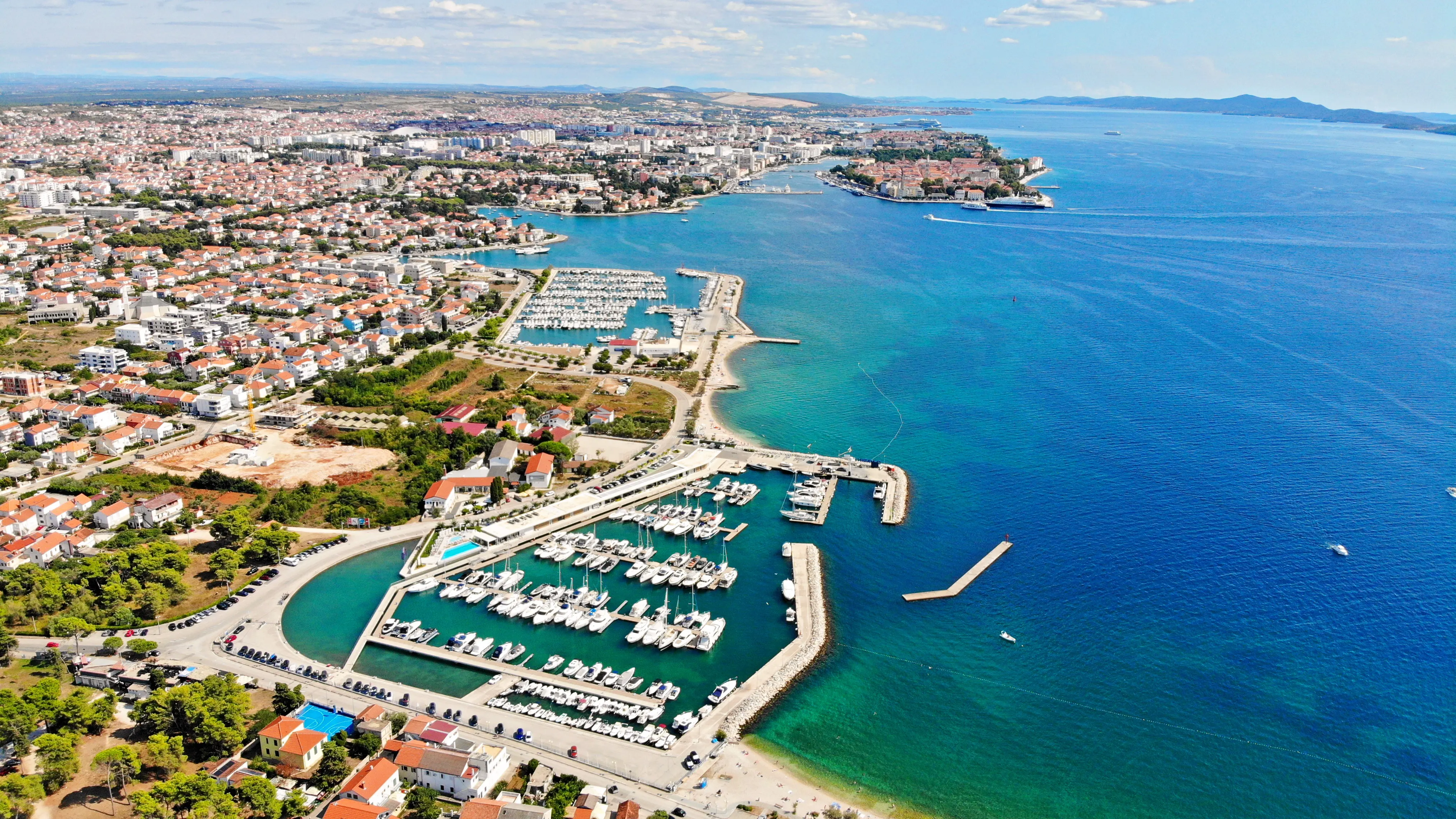
When director Alfred Hitchcock visited Croatia in 1964, he proclaimed that the coastal city of Zadar had the “most beautiful sunset in the world.” Situated in Northern Dalmatia, Zadar is home to a well-preserved Roman forum and two whimsical attractions: the Sea Organ and the Sun Salutation. Built into stairs that enter the Adriatic Sea, the Sea Organ’s pipes and whistles are “played” by the sea’s waves. Nearby, at the Sun Salutation, hundreds of glass plates embedded in the walkway absorb sunlight by day and put on a spectacular light show once the sun has set. Like most of Croatia’s coastal cities, Zadar also has beaches and a lively outdoor green market.
Much of Croatia’s Dalmatian Coast, including Zadar, was once part of the Republic of Venice. In Zadar, you can find a remnant of this historical chapter in the form of the 16th-century Land Gate and its winged Lion of St. Mark—a feature of Venice’s coat of arms.
If you love nature, you’ll appreciate that Zadar is within reach of five of Croatia’s national parks, including Plitvice, Krka, Paklenica, Kornati, and Northern Velebit. Collectively, the parks are well known for their hiking, boating, swimming, cycling, rock climbing, and birdwatching opportunities. See: Parkovihrvatske.hr.
The island of Pag, celebrated for its handmade lace and sheep’s-milk cheese called Paški sir, is also accessible. A landbridge from Zadar enables you to easily reach this popular destination by car or bus.
Zadar’s airport is serviced by discount airlines such as Ryanair, Eurowings, and EasyJet, as well as Croatia Airlines and Lufthansa. The city also offers ferry connections to the islands of Dugi Otok, Ugljan, Molat, Iž, and Ist, and has onward bus travel to Dubrovnik, Split, Zagreb, and Rijeka.
Rental prices will likely be higher the closer you are to Zadar’s Old Town. Currently, there is a one-bedroom apartment listed on Airbnb for $640 a month in November. It has an ideal location in the Old Town and features a modern interior—and even a Netflix subscription.
Healthcare in Croatia
Croatia has moderate to good healthcare, and many providers speak a basic level of English. However, be aware that medical facilities are more limited in smaller communities and on the islands. Costs are likely to be less than what you’d encounter back home, but it’s important to confirm that your health insurance plan will cover you in Croatia. Also, be aware that some products that you purchase over-the-counter back home might require a prescription in Croatia.
My husband and I were pleased with the routine medical care in the city of Split. We paid $185 for an annual physical examination that included blood tests, an abdominal ultrasound, and an EKG. Routine dental cleanings performed by a dentist cost $40 each. If you contact your country’s embassy in Croatia, they might be able to provide a list of English-speaking medical providers.
Pula—Real-Life Charm on the Istrian Peninsula
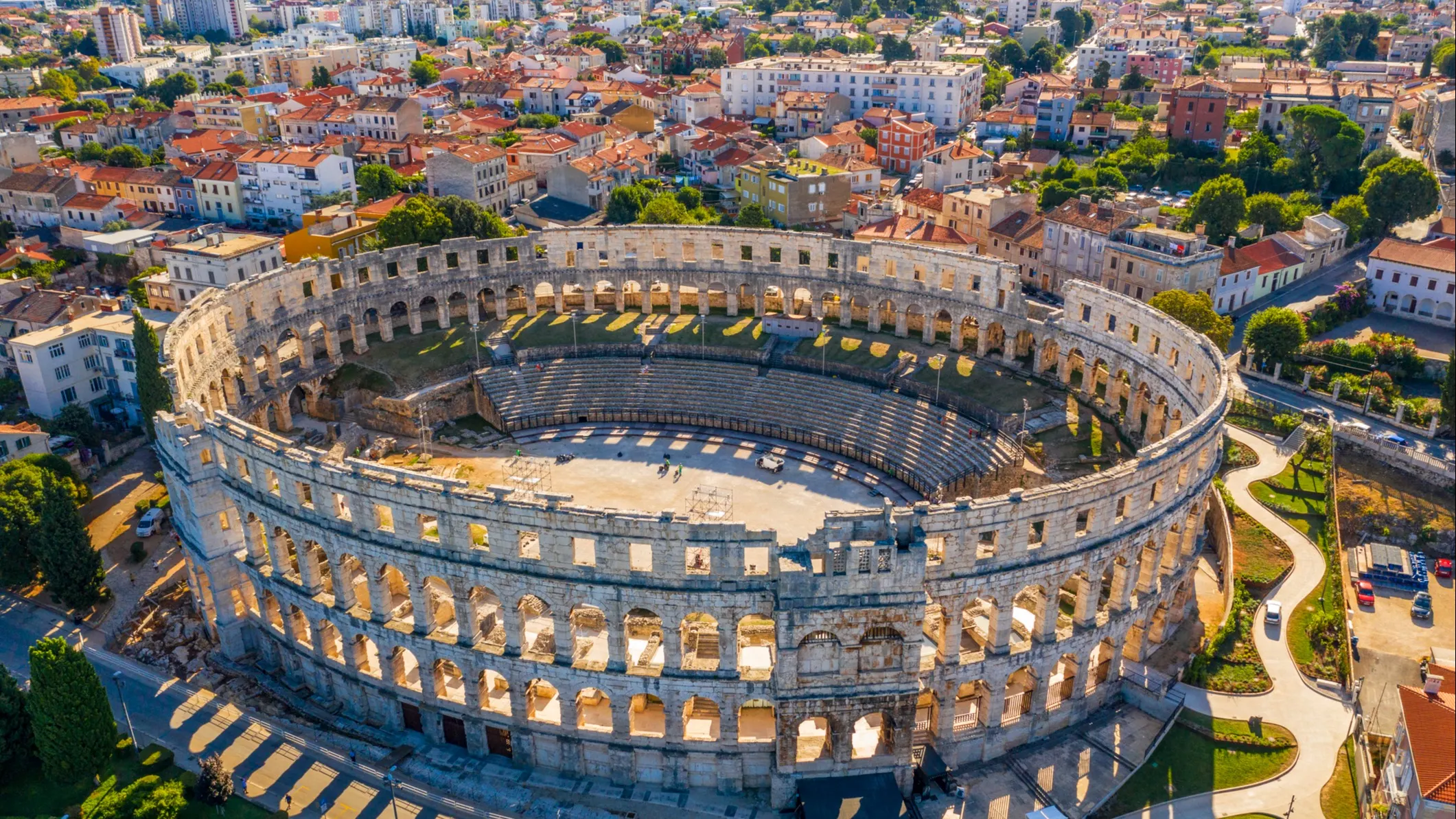
Situated in northwestern Croatia on the Istrian Peninsula, Pula is a working city with extraordinary ancient Roman architecture. Its star attraction is its 1st-century arena, which once seated up to 20,000 people. Other Roman sites include the Arch of the Sergii, mosaics, and a temple dedicated to Augustus.
Every summer, Pula residents celebrate the city’s Roman heritage by hosting the Days of Antiquity.
The Romans and the Austro-Hungarians both recognized Pula’s maritime potential and built significant military and mercantile infrastructure. Today, the port is still a hive of activity. After nightfall, the cranes of Pula’s dockyard, dubbed the “Giants,” come to life in an ever-changing lightshow.
Like other Croatian communities, Pula has a vibrant central market called Tržnica. This commercial center dates back to the early 20th century and houses fish and meat vendors. Outside the attractive market building, locals sell mounds of colorful local produce as well as bottles of Istrian olive oil.
Like Dubrovnik, Split, and Zadar, Pula has a good number of holiday apartments available for short-term rental. Currently, on Airbnb, there is a studio apartment going for $673 a month during November. It has all the amenities you need for a longer stay—including a washing machine. It’s located just 400 yards from Pula’s arena.
Pula has a small international airport, which is serviced by Croatia Airlines, SAS, and British Airways, as well as discount airlines like easyJet, Eurowings, and Ryanair. The city also offers decent bus connections throughout Istria and further afield in Croatia. It also has a train station.
From Pula, you can explore compelling Istrian destinations like Rovinj and Motovun. Rovinj is on the coast and boasts pastel-colored buildings tightly packed into a small peninsula. Motovun, with walls built by the Venetians, is a hilltop village reminiscent of something that you might see in Tuscany. Today, the town hosts an annual film festival.
The Istrian Peninsula is known for its cuisine. Istrian olive oil is rated among the world’s best. Fine truffles are also harvested here, making the peninsula an irresistible destination for gourmands.
There’s even more to explore if you make Pula your part-time home base. The Brijuni Islands National Park is just a short ferry ride from the nearby town of Fažana, and Venice is only about three hours away. Slovenia’s capital of Ljubljana (125 miles) and Croatia’s capital of Zagreb (165 miles) are also within easy reach of Pula.
Get Your Free Report on the World's Best Places to Retire in 2025
Get Your Free Report on the World's Best Places to Retire in 2025
Simply enter your email address below to sign up for our free daily postcard e-letter and we'll also send you a FREE report on The World's Top 10 Retirement Havens for 2025.

By submitting your email address, you will receive a free subscription to IL Postcards and special offers from International Living and our affiliates. You can unsubscribe at any time, and we encourage you to read more about our Privacy Policy.
Cost of Living on The Dalmatian Coast
The following monthly budget is based on the cost of living for a couple staying on Croatia’s Dalmatian Coast or on the Istrian Peninsula. Rental costs are highest during peak-travel months between June and September.
| Expense | U.S. $ |
|---|---|
| Housing (rent and utilities for a furnished one-bedroom apartment) | $560 – $1,350 |
| Groceries | $515 |
| Dining out (twice per week: one lunch, one dinner) | $425 |
| Entertainment (museum entries, wine tasting tour) | $180 |
| Health insurance (international plans vary greatly based upon age and personal circumstances) | $225 |
| Transportation (bus/ferry/Uber/taxis) | $145 |
| Total: | $2,050 – $2,840 |
Related Articles
The Enchantment of a Retirement in Croatia
